
English | 中文

One Step Ahead: Seminar on Application of ISSB Standards in China successfully held in Shanghai
source:goldencsr date:2024-12-25 13:46:18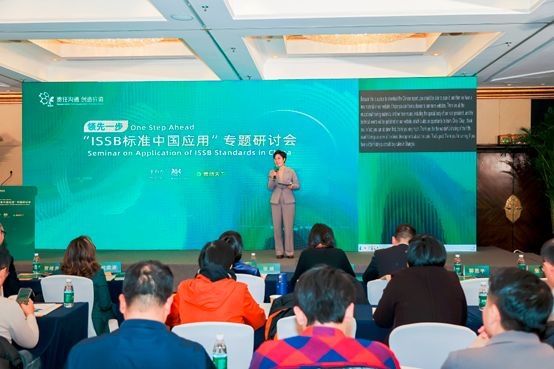
As 2024 draws to a close, sustainability disclosure has seen rapid development, accompanied by the introduction of new standards and regulations, closer collaboration, and many practices yielding new results.
If there were a hot word of the year , ISSB standards would be a top contender. This is not only due to their significant impact but also their profound implications: they provide a unified global benchmark for corporate sustainability disclosures and mark a new era for listed companies in sustainability reporting.
According to the latest data, 30 countries or regions have announced or are adopting ISSB standards. These areas account for 57% of global GDP, 50% of global greenhouse gas emissions, and 75% of the total market capitalization of global capital markets, excluding the U.S.
This new era brings new opportunities and challenges. What are the latest developments in ISSB standards? How can Chinese companies implement them? What successful experiences do companies have? These questions are not only key to building new competitive advantages but also driving forces for China’s sustainable development.
In this context, on December 13th, the “One Step Ahead: Seminar on ‘Application of ISSB Standards in China’”, co-hosted by the British Embassy Beijing and GoldenBee Consulting, was successfully held in Shanghai. Over 100 guests attended, focusing on the global development and Chinese application of the new ISSB standards, as well as comparisons with relevant Chinese standards and corporate practices.
Viewpoints
At the opening, Michael Harvey, Counsellor of Financial and Professional Services at the British Embassy Beijing, highlighted the UK’s significant milestones and achievements in promoting sustainability disclosure.
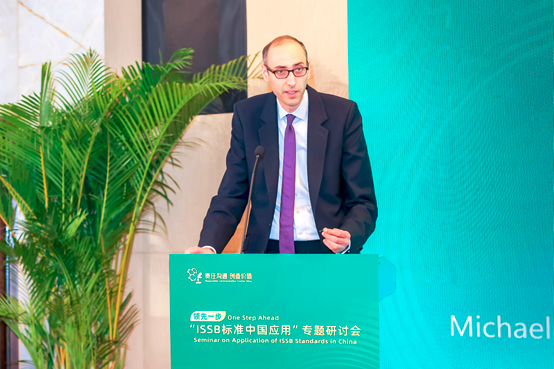
Michael Harvey
He noted that the ISSB standards, the achievement of international cooperation, aim to enhance transparency and efficiency in capital markets through unified disclosure standards. Implementing these standards will improve the comparability and credibility of disclosures, attracting more investors focusing on ESG.
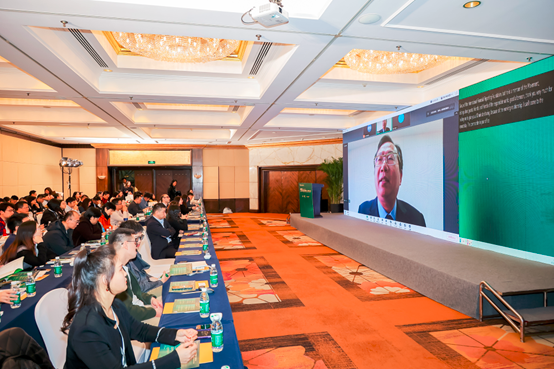
Zhang Zhengwei
Zhang Zhengwei, Special Advisor to the ISSB Chair and Head of Beijing Office, delivered a video address, reviewing the development of ISSB standards as a global benchmark for sustainability information. He highlighted the development of ISSB standards was also the results of support from the public and major economic governance platforms.
Zhang Juan, Deputy Director and Researcher at the Research Center of Shanghai Commercial Development, shared Shanghai’s experience and achievements in promoting corporate sustainability disclosures.
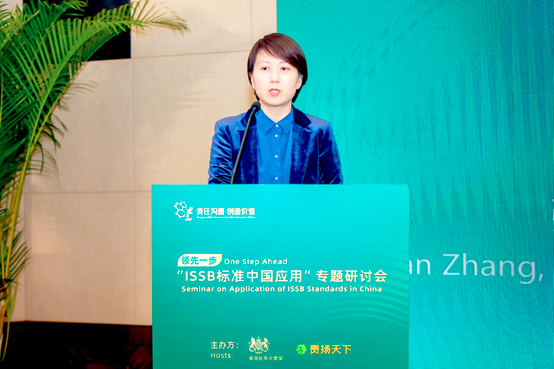
Zhang Juan
According to her, in March 2024, the Shanghai Municipal Commission of Commerce released the Three-Year Action Plan for Accelerating the Enhancement of Environmental, Social, and Governance (ESG) Capabilities of Foreign-Related Enterprises in Shanghai (2024-2026). This policy, based on the urgent needs and existing foundations of foreign-related enterprises, aligns with domestic and international trade and environmental rules and has boosted the overall disclosure rate of foreign-related enterprises in Shanghai.
Insights
In the following sharing session, four experts from various fields and institutions delivered fascinating speeches and shared insights on the development and application of ISSB standards in China, covering both theoretical and practical perspectives.
Si Jialing, IFRS Foundation’s Regulatory Affairs Manager for Asia, detailed the transition from voluntary to mandatory sustainability disclosures, the global adoption progress of ISSB standards, and future plans.
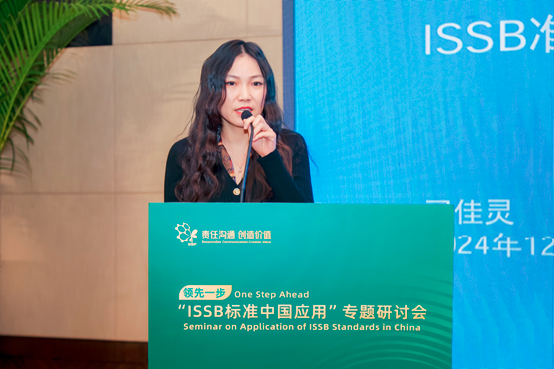
Si Jialing
She shared the governance structure, market demand, core values, global disclosure benchmarks, and progress in major jurisdictions of the ISSB standards.
Sun Yumeng, from the Corporate Governance Department of the China Association for Public Companies (CAPCO), analyzed the similarities and differences between ISSB standards and the Guidelines on Self-Regulation of Listed Companies - Sustainability Report in terms of basic concepts, format styles, disclosure frameworks, topics, and indicators.
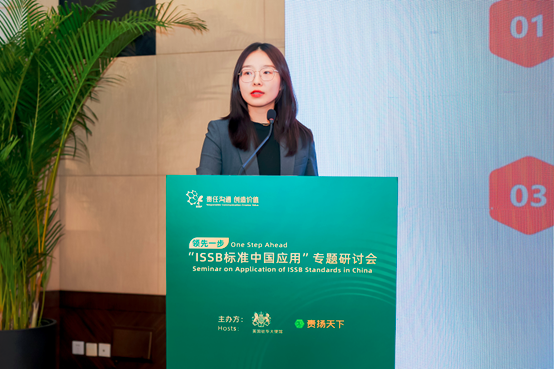
Sun Yumeng
In addition, she suggested companies strengthen stakeholder engagement and enhance their ESG capabilities.
Dai Yibo, Vice President of GoldenBee Consulting and a member of the IFRS Sustainability Reference Group, has been participating in the update of the 77 industry standards issued by the SASB alongside global experts. Based on the four pillars of standard implementation, namely governance, strategy, risk management, and indicators and targets, she conducted an in-depth analysis of the implementation roadmap and key points of the ISSB standards.
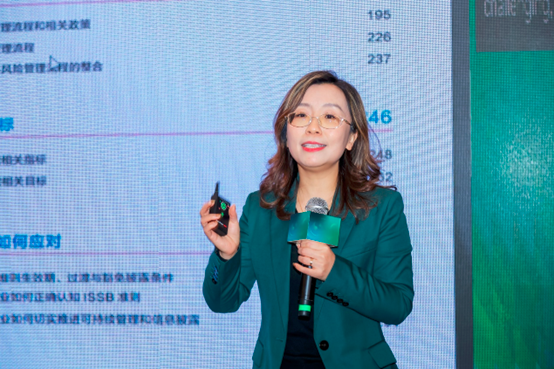
Dai Yibo
She referenced case studies from the book ISSB Standards China Application Guide (Volume 1) IFRS S1 Interpretation and Application, co-authored by GoldenBee Consulting and the Sustainability Standards Research Center of Central University of Finance and Economics. ISSB Standards China Application Guide (Volume 2), focusing on IFRS S2 climate-related disclosures, is set to be released early next year.
Yao Chenchen, ESG Director at Jinko Solar, shared corporate practices focusing on strategies and actions for climate governance, and introduced the company’s efforts in sustainability disclosure.
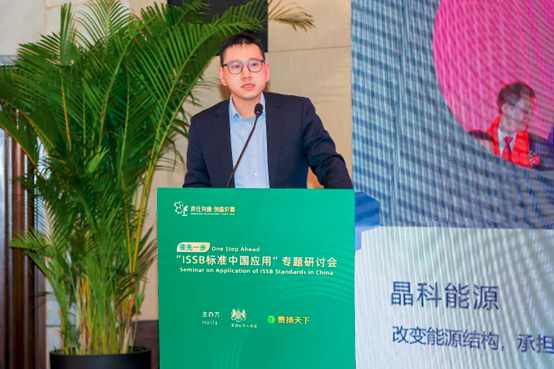
Yao Chenchen
The seminar thoroughly explored the latest developments and impacts of ISSB standards in China and showcased the latest initiatives and practices of Chinese institutions and companies responding to ISSB standards. We look forward to more Chinese companies taking "one step ahead" to disclose sustainability information based on international standards, continuously enhancing their global ESG competitiveness.